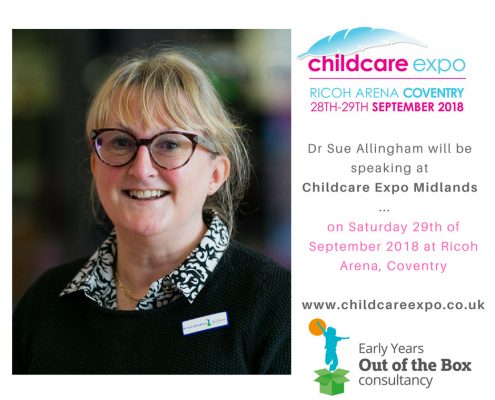What must we really understand about the ‘gap’ in learning so we can – ‘mind the gap’?
By Dr Sue Allingham, Early Years Consultant & Speaker at Childcare Expo Midlands 2018
23rd August 2018
Share this entry:
I’m writing this as hundreds of young people are receiving their ‘A’ Level results. Social media is buzzing with successes and failures. And there are the inevitable conversations about the impact that Early Childhood Education has on future academic success. I have already seen a drop in the results for ‘A’ level maths being blamed on a perception that maths is not properly taught in the Early Years.
Since the publication of the Ofsted report ‘Bold Beginnings’ (November 2017) the new buzz phrase seems to be that ‘children who start behind never catch up’. But what does this actually mean?
We will shortly receive this year’s data on the results of the Early Years Foundation Stage Profile. The next conversation will be around ‘the gap’ in achievement. The focus will be on who didn’t achieve a ‘good level of development’ and what must be put in place to address this. But are we really addressing the roots of the problem? Is it ever going to be possible to ‘narrow’ or even ‘close’ the ‘gap’? Do children really ‘start behind and never catch up’?
I use two lenses to unpick and understand what we need to know in order to tackle the perceived ‘gap’ in achievement. And this is what I will share through practical activities in my seminar at Childcare Expo Midlands.
PILES
The first lens is a reminder of this acronym. It seems to have been forgotten these days. But understanding how these areas interlink is key to early teaching and learning:
Physical
Intellectual
Language
Emotional
Social
There is an advert at the moment with the tag line ‘We are all born four by four’, and it shows a baby crawling and enjoying every minute of it. It is no coincidence that ‘Physical’ comes first in the list above. When we have meetings about addressing perceived ‘gaps’ in attainment, how often do we reflect on how the reading, writing and maths expected from the children is actually rooted in physical development? In fact, what do we actually know about the children we are working with? Do we even know if they crawled?
Soft Data
The second lens is integral to the first. We are increasingly caught up in data and statistics on spreadsheets these days. But what do they really tell us? Do they tell us what we really need to know? What is the real story of the child? How do we know? This is the soft data, without which we cannot really assess a child on their achievement.
The way that children are increasingly seen as numbers, and not individuals is a worrying trend – my aim is to think about this in an ‘out of the box’ way.
Tickets for Dr Sue Allingham’s seminar, “What ‘narrowing the gap’ really means in early years” (on Saturday 29th September at Childcare Expo Midlands) are now available. Register now to save your seat!
Why attend Childcare Expo?
Join over 2,500 like-minded individuals from the early years sector who are dedicated to improving both practice and their childcare settings.
Attend educational seminars to credit your CPD
Meet the experts to have your questions answered
Receive fantastic onsite offers and discounts
Experience expert-led informative hands-on workshops
Network with peers and industry players
Pick up hundreds of new product ideas and services
And most of all, enjoy a great day out with your colleagues





